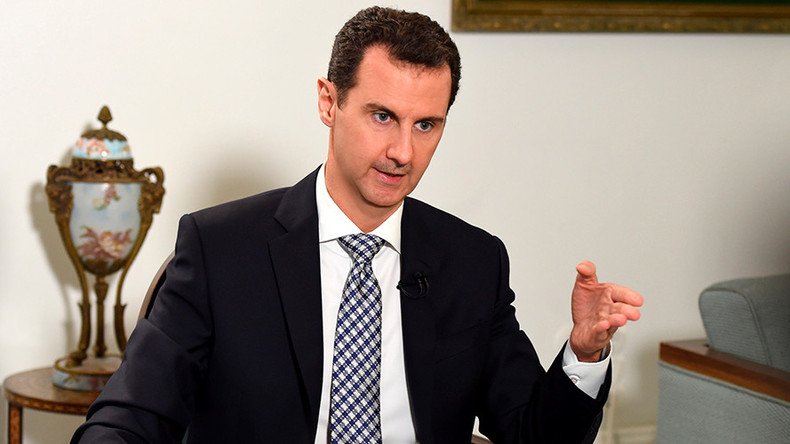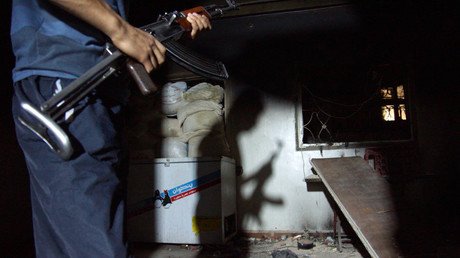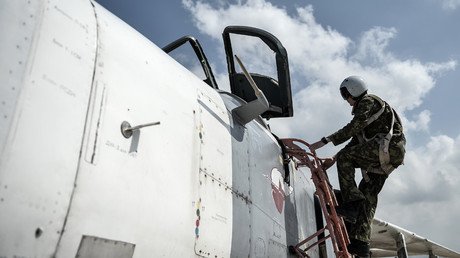‘Syrian Army’s battlefield successes speed up political settlement’ – Assad

Many countries would like to see the Syrian Army defeated so Damascus would become more concessive, President Bashar Assad told Sputnik in an exclusive interview. The army’s advances are in fact a major contribution to eventual peace, he said.
The Syrian Arab Army’s success on the battlefield, with Russia’s support, is going to speed up a political settlement in Syria, not hinder it, Assad believes.
“Because there are those who accuse us and Russia of [hindering the peace process], when trying to present Russia's intervention aimed at countering terrorism as an intervention to support the president or the Syrian government, and thus, as an obstacle in the way of the political process,” Assad told the director general of Rossiya Segodnya (incorporating Sputnik and RIA Novosti news agencies), Dmitry Kiselev.
Putin calls up Assad to congratulate Syrian forces on retaking Palmyra https://t.co/5ARAWMTAADpic.twitter.com/9D9AULEi6L
— RT (@RT_com) March 27, 2016
Assad named Saudi Arabia, Turkey, France and the United Kingdom among countries that “are counting on our defeat on the battlefield in order to impose their conditions at the negotiations.
“So these military actions and successes will lead to the acceleration of the political settlement, and not prevent it,” Assad said.
The president also stressed the need to continue fighting terrorism within Syria, as well as in Iraq, accusing Turkey, Saudi Arabia, France and the United Kingdom of providing support to terror groups instead of eradicating them.
“Terrorism - that’s the real problem. We must fight it on the international level, because terrorism affects not only Syria. Terrorism exists in Iraq. It is directly supported by Turkey. It is directly supported by the ruling royal family of Saudi Arabia, as well as a number of Western states, especially France and the United Kingdom,” Assad said.
President Assad also addressed the issue of the Russian military presence in Syria, saying he does not see it as occupation, but rather as means to help strengthen stability and security in the country.
"With Russia we have relations that are over six decades old, they are built on trust and clarity… when Russian military bases appear in Syria, it’s not occupation, on the contrary - it’s the strengthening of friendship and ties, it’s the strengthening of stability and security. And that’s just what we want," Assad said.
Throughout all five years of the conflict Damascus has always been ready to negotiate and remained flexible, even when dealing with unfriendly opponents, putting everything at stake to find a compromise, years before Russia intervened in the Syrian crisis militarily.
“The goal is not to miss a single chance for settlement, without [first] trying it,” Assad said, adding that “If [you] go back to the policy of the Syrian state five years ago, we responded to all the initiatives, without exception, coming from all sides - even if they were not friendly.
“We went to Geneva and continue to show flexibility,” Assad said.
“The support provided by friends of Syria and the military achievements of the Syrian Army — all this will lead to an acceleration of the political settlement, and not the opposite. We have not changed our position, not before the support from Russia nor after,” the president stressed.
The president also noted that despite a number of unresolved issues, the draft of a new constitution for Syria is likely to be ready by August - the target time outlined by US Secretary of State John Kerry following talks in Moscow.
“A draft version of the constitution will be possibly ready within a few weeks. Experts are present, we have finished proposals that can be assembled together. As for August, it is a suitable and sufficient time,” Assad said.
“A few issues remain, and not with respect to how much time will be spent on formulating the text of the constitution, the question is - what will the political process that we will use to discuss the constitution be,” he underlined.
Pentagon concedes Russia’s ‘constructive role’ in Syrian ceasefire, fight against ISIS pic.twitter.com/am7PLnJkfb
— RT (@RT_com) March 30, 2016
At a conference in Hasakah province on March 17 attended by some 200 delegates from Syria’s north, which is inhabited by the Kurds, an announcement was made on the creation of the so-called Federal Democratic System of Rojava and Northern Syria. Commenting on the possible federalization of the country, Assad said he does not see it working out, while expressing a firm belief that the majority of Kurds want to live in a united Syria.
“We must not confuse Kurds who want a federal regime with all Kurds.
From the geographical perspective, Syria is a very small country for federalization to exist in it. I do not think that Syria is ready for federalization, there are no natural factors for it to be possible.”
Assad stressed, however, that “in the end, as a state, we will agree to everything that the people agree to.”
Concerning the format of the new Syrian government, the Syrian president stated it should be agreed upon in Geneva.
“That’s the goal of 'Geneva' - an intra-Syrian dialogue during which we will agree on the format of this government. Of course, we have not yet worked out a final understanding, because other Syrian parties have not yet agreed to this principle.”
He added that “it is logical that independent forces should be represented there [in the government], as well as opposition forces and forces loyal to the government.”
Commenting on the liberation of the ancient Syrian city of Palmyra, President Assad said it had been made possible by the will of the Syrian people to cleanse their land from terrorists.
“How do we do it? Simple. We had the desire to cleanse Syria completely from terrorists. There is no other option to protect Syria, but to fight against terrorism. And we have the will, the Syrian people, the Syrian army have the will to cleanse each region [from IS]. At the same time our friends support us – Russian support has been a major and effective part of achieving these results.”
The President expressed disappointment at the reluctance of the global community to acknowledge the liberation of Palmyra.
“So far this news has not been taken in. In fact, some in the world have realized it, but do not want to believe. It’s been two days after the release of Palmyra, and a number of countries involved in the supposed battle against terrorism and part of the international US-led coalition, have not yet reacted to the news. There is a reason for it – the occupation of Palmyra a year ago was clear evidence of the coalition’s failure, lack of serious approach in the fight against terrorism, particularly in dealing with IS.“
After the interview, Kiselev commented to a Russian TV channel that “President Assad is in great shape – both intellectually and emotionally.
“He is inspired by the victory of his army and the retake of Palmyra, speaking ironically about Western leaders as if they swallowed their tongues and did not notice this event,” Kiselev said.
The Syrian leader “is ready for the so-called political transition, [and] approaches it responsibly and creatively,” Kiselev added.
The first part of the full interview with President Assad is available in English here.
Meanwhile, certain representatives of the Syrian opposition entirely reject any idea of a government with Bashar Assad.
“The government, whether it's new or old, as long as it is in the presence of Bashar al-Assad, is not part of the political process,” said George Sabra, a negotiator for the High Negotiations Committee (HNC) that represents the Syrian opposition at peace talks in Geneva.
“What Bashar al-Assad is talking about has no relation to the political process,” Sabra added, as cited by Reuters.
Asaad al-Zoubi, an HNC member, said what the Syrian people and the Geneva negotiating team want is “a transitional ruling body with full executive powers and authorities, including presidential authority, whereas [Assad’s] regime wants a participatory government.”














